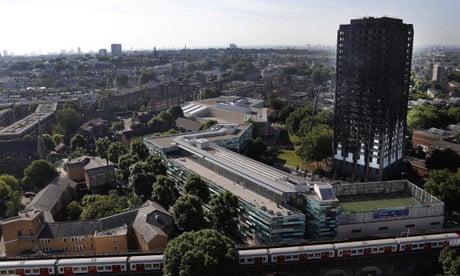For years successive governments have built what they call a bonfire of regulations. They have argued that “red tape” impedes our freedom and damages productivity. Britain, they have assured us, would be a better place with fewer forms to fill in, fewer inspections and less enforcement.
But what they call red tape often consists of essential public protections that defend our lives, our futures and the rest of the living world. The freedom they celebrate is highly selective: in many cases it means the freedom of the rich to exploit the poor, of corporations to exploit their workers, landlords to exploit their tenants and industry of all kinds to use the planet as its dustbin. As RH Tawney remarked, “Freedom for the pike is death for the minnows.”
It will be a long time before we know exactly what caused the horrific fire in the Grenfell Tower, and why it was able to rage so freely, with such devastating loss of life. But it seems at this stage likely that the rapidity with which the fire spread was either caused or exacerbated by the cladding with which the tower was refurbished.
There have been plenty of warnings that cladding can present a severe fire risk. To give just one example, in 1999 the House of Commons select committee on environment, transport and rural affairs published a report entitled Potential Risk of Fire Spread in Buildings Via External Cladding Systems.
But both Conservative and New Labour governments have been highly reluctant to introduce new public protections, even when the need is pressing. They have been highly amenable to tearing down existing protections at the behest of trade associations and corporate lobbyists. Deregulation of this kind is a central theme of the neoliberal ideology to which both the Conservatives and Labour under Tony Blair succumbed.
In 2014, the then housing minister (who is now the immigration minister), Brandon Lewis, rejected calls to force construction companies to fit sprinklers in the homes they built on the following grounds:
Conservative MPs see Brexit as an excellent opportunity to strip back regulations
“In our commitment to be the first Government to reduce regulation, we have introduced the one in, two out rule for regulation … Under that rule, when the Government introduce a regulation, we will identify two existing ones to be removed. The Department for Communities and Local Government has gone further and removed an even higher proportion of regulations. In that context, Members will understand why we want to exhaust all non-regulatory options before we introduce any new regulations.”
In other words, though he accepted that sprinklers “are an effective way of controlling fires and of protecting lives and property”, to oblige builders to introduce them would conflict with the government’s deregulatory agenda. Instead, it would be left to the owners of buildings to decide how best to address the fire risk: “Those with responsibility for ensuring fire safety in their businesses, in their homes or as landlords, should and must make informed decisions on how best to manage the risks in their own properties,” Lewis said.
This calls to mind the Financial Times journalist Willem Buiter’s famous remark that “self-regulation stands in relation to regulation the way self-importance stands in relation to importance”. Case after case, across all sectors, demonstrates that self-regulation is no substitute for consistent rules laid down, monitored and enforced by government.
Crucial public protections have long been derided in the billionaire press as “elf ’n’ safety gone mad”. It’s not hard to see how ruthless businesses can cut costs by cutting corners, and how this gives them an advantage over their more scrupulous competitors.

Grenfell Tower fire is corporate manslaughter, says Labour MP
The “pollution paradox” (those corporations whose practices are most offensive to voters have to spend the most money on politics, with the result that their demands come to dominate political life) ensures that our protections are progressively dismantled by governments courting big donors.
Conservative MPs see Brexit as an excellent opportunity to strip back regulations. The speed with which the “great repeal bill” will have to pass through parliament (assuming that any of Theresa May’s programme can now be implemented) provides unprecedented scope to destroy the protections guaranteed by European regulations. The bill will rely heavily on statutory instruments, which permit far less parliamentary scrutiny than primary legislation. Unnoticed and undebated, crucial elements of public health and safety, workers’ rights and environmental protection could be made to disappear.
Too many times we have seen what the bonfire of regulations, which might sound like common sense when issuing from the mouths of ministers, looks like in the real world. The public protections that governments describe as red tape are what make the difference between a good society and barbarism. It is time to bring the disastrous deregulatory agenda to an end, and put public safety and other basic decencies ahead of corner-cutting and greed.
